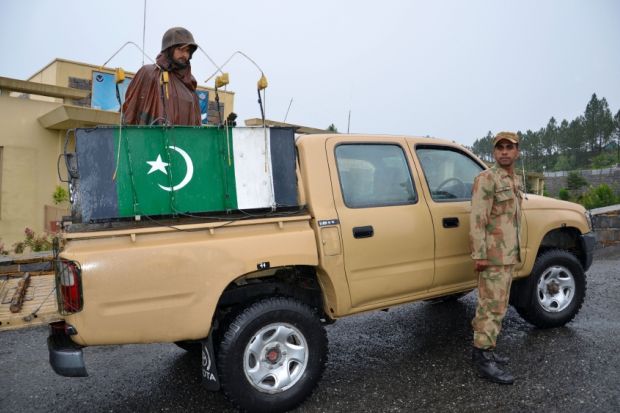The attack on Bacha Khan University in Charsadda, northwest Pakistan, which has killed at least 19 people, proves that there will be no lull in the spate of violence that many believed to have reached its climax just over a year ago with the deaths of more than 150 people, mostly children, at the Army Public School in nearby Peshawar. It also heightens fears that institutions like Edwardes College in Peshawar, where I was principal for four years until 2010, will be attacked.
One Tehreek-e-Taliban Pakistan (TTP) commander said that the group had carried out the Bacha Khan attack in response to a military offensive against militant strongholds, but its main spokesman denied this, the BBC has reported.
In my own case, the death threat that I received during my period as Edwardes principal was attributed to my commitment to the promotion of co-education.
But now, increasingly, the intent of terrorist attacks on soft educational targets appears to be revenge for military action against extremism.
Charsadda has been subject to a spate of politically motivated violence in recent years.
Bacha Khan University, which currently has about 3,000 students, was founded in 2012. Is named after Abdul Ghaffar Khan, who was nicknamed “the Frontier Gandhi” for his non-violent opposition to British rule and who combined regional Sufi-inspired Islam with Gandhian non-violence. He and Gandhi visited Edwardes College together in 1933.
Read more: When terrorists attack universities, they attack progress
According to reports, the attack on Bacha Khan coincided with a ceremony on campus marking the 28th anniversary of his death.
The savageness of the attack on the university, and on similar soft targets such as the Army Public School in Peshawar, raises serious doubts about the wisdom of calls by Imran Khan, the former cricketer who is now chairman of the Tehreek-e-Insaf party he founded, to negotiate with Taliban extremists.
On the other hand, prime minister Nawaz Sharif's commitment to “wipe out the menace of terrorism from our homeland”, expressed after the Bacha Khan attack, is unlikely to be attained by military means.
This dilemma is aggravated by the historical events whereby Pakistan was drawn – albeit reluctantly – into the consequences of the Russian intervention in Afghanistan in the 1980s.
The West must never forget that Pakistan supported its extended Cold War policies by equipping the mujahideen both ideologically and militarily in jihad against the Russians. When the Russians left, there was a vacuum that was eventually filled by the nascent Taliban, led by Mullah Omar, who struck up a friendship with Osama bin Laden.
The rest is history, but it is the early stages of that history that should be of salutary significance to contemporary Western politicians when they demand “more, more” of the Pakistani leadership in crushing the consequences of Western (and Russian) incompetence.
Pakistan therefore currently finds itself on the horns of a dilemma, aggravated by the legacy of its earlier commitment to the extended Cold War and the likelihood of future Taliban gains in Afghanistan.
David L. Gosling is a life member and former Spalding fellow at Clare Hall, Cambridge. He was principal of Edwardes College, Peshawar between 2006 and 2010 and recently published a book on his experiences, Frontier of Fear: Confronting the Taliban on Pakistan’s Border.
Register to continue
Why register?
- Registration is free and only takes a moment
- Once registered, you can read 3 articles a month
- Sign up for our newsletter
Subscribe
Or subscribe for unlimited access to:
- Unlimited access to news, views, insights & reviews
- Digital editions
- Digital access to THE’s university and college rankings analysis
Already registered or a current subscriber? Login





